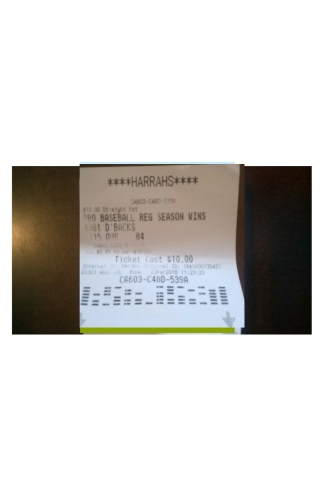Growing up in Louisville, Kentucky in the 60s and 70s, almost everybody I knew gambled. Whether it was trips to Churchill Downs, penny-ante poker with the family, or betting football parlay cards, wagering was part of everyday life. I think our civic attachment to gambling is somehow tied up with being a river town. My friends tell me that Pittsburgh and Cincinnati are the same way.
The only person I knew growing up who seemed to have no interest in games of chance was my brother. When my Dad died, John and I were standing around at the funeral home when an elderly man walked up, smiled, shook our hands and expressed his condolences. As he shuffled away, my brother asked “Who was that?”
“Charlie. Charlie Donnelly*.”
“Who’s he?”
I looked at my brother. “Charlie. You know, from the factory. ‘Hots’.”
My brother stared at me in disbelief. “Dad knew a guy named ‘Hots’?”
“Yeah. Hots. You know. Dad’s bookie.”
“Dad had a bookie?”
When my wife and I moved to Indiana, what I found most surprising was the general attitude toward gambling. (Well, that and the complete absence of anyplace serving a decent breaded fish sandwich. But, I digress.) Most of our new friends had never bet on a horse race or a ball game. I started an irregular poker night, and, to this day, sometimes have to verbally repeat the rank of poker hands in the middle of a game.
So I think I understand why some baseball fans think Pete Rose shouldn’t be banned from baseball. When you consider what some Hall of Famers have gotten away with (looking at you, Ty Cobb), merely betting on his team to win as a manager doesn’t seem so bad. Here’s why I disagree.
In a game with tons of unwritten rules, this one is written down everywhere…. I’ve never graced a major league clubhouse, but I’ve been in several triple-A versions. And my understanding is that in every single clubhouse in organized baseball, there is a sign that warns players, managers, and coaches of the severe penalty for betting on baseball. Until just a few years ago, there weren’t any such signs warning about performance-enhancing drugs. So the people who justify Rose by saying “at least he didn’t do steroids” have it exactly backwards. He didn’t get daily warnings about PEDs; but he did about gambling.
I was a part-time usher in a minor league ballpark for one summer, and they told us that we’d be fired for betting on baseball. That’s right….ushers.

Concrete evidence of my lack of wagering acumen. A bet that the Dbacks would win more than 84 games this year. Yikes.
Rose’s claims about only betting his team to win, and only when he was a manager are unconvincing……Rose contends he only bet the Reds to win, and that he never bet baseball while he was playing. I’ve never seen hard evidence that either of these claims is untrue, but I don’t believe them. As much as I love gambling, I know the difference between a recreational gambler and a degenerate. And somebody who is already comfortable risking a lifetime ban is unlikely to set moral standards like only betting his team to win.
And are we really expected to believe that he only started exploiting the edge he had by betting on baseball – a sport in which he was the ultimate insider – after he was done playing? Why would he think it was wrong to bet as a player but not as a manager, especially when it’s thoroughly documented that he was betting on other sports?
Even if he only bet his team to win as a manager, it’s still intolerable…..a manager makes decisions every day that affect the next day’s game. Leave the starter in or bring in a reliever? Is the bullpen shot? Are any left-handers available to face a predominantly left-handed hitting team tomorrow? Do I need to bring up a reliever from the minors and sacrifice a position player spot? What if I’ve bet today’s game at plus-240 and I know we’re probably minus-120 tomorrow?
It diminishes the Hall of Fame when the all-time hits leader and one of the greatest players of the 20th century isn’t included…. OK, this one has some merit, but here’s a solution: lift the ban posthumously. That allows Rose’s singular achievements to be recognized while a) preventing Rose from benefiting financially and b) ensuring that current players don’t assume that they can take a chance (so to speak) and bet on baseball with the hope of getting a subsequent ban lifted.
If Major League Baseball lifts the ban on Pete Rose, the Hall might as well get started on that long-anticipated “Great Players of the Steroids Era” exhibit in Cooperstown.
- name changed

[…] adulation of Pete Rose, for one. I’ve written before (quite artfully, I’d say, right here (https://wordsbymattroberts.com/2016/09/19/judging-pete-rose/) about all the reasons why he shouldn’t be allowed back in baseball. But you still see fans at […]
LikeLike